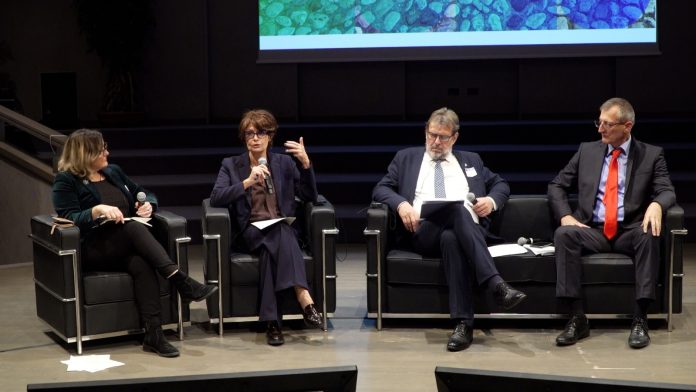
by InTrieste
Regional leaders and European delegates gathered in this northeastern border city on Wednesday to call for stronger cross-border cooperation and a renewed political commitment to European integration, as the European Union prepares its next programming cycle.
Speaking at a panel on transfrontier regions and EU enlargement, Alessia Rosolen, Friuli Venezia Giulia’s regional councillor for Labor, Universities, Research and Training, said that subsidiarity and joint planning across national borders should guide Europe’s future development. She pointed to emerging transnational supply chains — such as the hydrogen initiative linking Friuli Venezia Giulia, Slovenia and Croatia — as examples of how shared projects can unite regions and strengthen the EU’s cohesion.
The discussion was part of the European Crossborder Platform, hosted this year by the Region of Friuli Venezia Giulia in Gorizia and organized with the Association of European Border Regions. The forum brought together 257 participants from across the continent. The panel, moderated by Caitriona Mullan, included Tomislav Žigmanov, vice president of the provincial government of Vojvodina, and Kerim Medjedovic of the Local Democracy Agency in Nikšić, Montenegro.
Rosolen opened her remarks by reading a message from Italy’s foreign minister and deputy prime minister, Antonio Tajani, before stressing that the process of EU enlargement “cannot be reduced to a technical or bureaucratic exercise.” Instead, she said, it should be understood as a political and cultural undertaking that begins in border regions, where the practical work of European cohesion is most visible.
Regional and local governments, she argued, serve as “strong allies” of both EU institutions and national authorities by ensuring that integration remains inclusive and rooted in citizens’ daily lives. Friuli Venezia Giulia, she noted, has long played an active role in cross-border relations — coordinating the bilateral Italy–Slovenia committee and creating, alongside Carinthia and Veneto, the Euroregion Senza Confini, an EGTC designed to improve emergency management and reduce barriers for residents in frontier areas.
Rosolen also underscored the need for strategic thinking and multilayered cooperation to ensure long-term stability and development. She highlighted the region’s early adoption of European Groupings of Territorial Cooperation, which allow member regions to implement shared policies beyond national borders. She also pointed to Bridge4EU, a new instrument intended to reduce administrative obstacles and support shared public infrastructure and services.
Education and workforce development, she said, remain essential to supporting professional mobility and nurturing local talent in cross-border areas — a foundation for what she described as a more sustainable European future.
Turning to the EU’s relationship with the Western Balkans and candidate countries, Rosolen emphasized that the stability and transformation of Central and Southeastern Europe are closely tied to the future of the Union. Renewed political commitment and a shared strategic vision, she said, are vital to advancing integration. “The Balkans must be protagonists of their European future,” she added, noting that regional cooperation remains key to overcoming lingering tensions.
Rosolen reminded attendees that Friuli Venezia Giulia plays an active role in the Adriatic-Ionian Macro-Region, which brings together EU member states and Western Balkan countries to improve connectivity, competitiveness and regional appeal — an area home to more than 70 million people.
She concluded by calling on EU member states to support the Balkans in three priority areas: strengthening democratic governance, reinforcing a sense of European belonging, and expanding transnational and cross-border cooperation.































